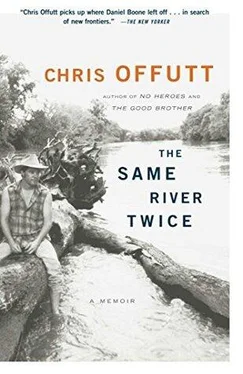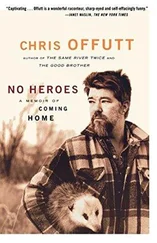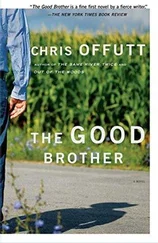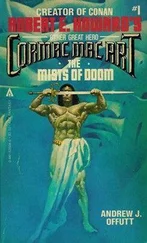The meth had shot its wad. Winner steered to the shoulder and we switched sides. In less than a minute he slept the speed freak’s twitchy sleep and I studied the tattoos on his arms. An eyeball topped a pyramid sitting on a skull. Spiderwebs stretched between his knuckles. The number thirteen crinkled at the base of his thumb. Etched into flesh was the phrase “Born Dead.”
I leaned out the window, allowing the wind to scrub my face. Stars sprinkled the night sky like a random computer printout. A full moon hugged the mountains. Bug corpses smeared the windshield, reminding me of Al. Maybe he and Winner were both correct — the world was doomed to extinction. Global annihilation was better than getting old; heaven and reincarnation were the same guarantee. No one surfed the river Styx.
Winner dropped me off at dawn near a town called French Gulch and I followed Highway 299 west to the coast. For a week I wandered down the edge of what Spanish explorers originally considered to be an island. Years later wagon trains lost everything on their western trips, following ruts six feet deep. The desert fried the very old and the very young. Spring settlers passed thawing corpses. Now there are seventy languages spoken in Los Angeles and if California were a country, it would be the sixth most productive in the world. The state was like the end of a pier crowded by fishermen with tangled lines, all hoping for a big one.
The first night, I slept on the beach. My backpack was stolen by two kids on bicycles. I went to a homeless shelter, where row after row of cots lined a stained floor. To prevent theft while sleeping, I threaded one arm through my jacket and rolled up the rest of my clothes for a pillow. Instead of camaraderie with my brothers, I felt like a pariah invading their ranks. These guys were hard-luck, hard-bit men, not like me at all. The shelter held men who tricked at night and saved their money for a sex change, men who spat tubercular blood, men who’d lost their apartments to co-op renovators, their jobs to automation.
All of us denied that we were truly homeless. Every conversation began with past success, then skipped to the future. The present was never mentioned. We were living in a temporary situation, each believing our own was more temporary than the rest. Cigarettes were currency. Talk was defense. I babbled constantly and the creeps left me alone.
I spent my days at the beach, eating tacos and staring at women in slight swimsuits. They trimmed their yoni hair in order to expose more flesh. No one looked at me. I was invisible, a nonentity. I craved every woman who walked by, but understood that there was nothing for me save fantasy. Twice I was run off particular sections of sand by surfers.
I began drawing, signing and dating each sketch, and leaving them in front of the scene I’d sketched. I imagined that an art dealer was tracking my passage, saving every drawing. He’d eventually contact me with an offer of studio space and supplies if I’d translate my brilliant studies into paintings. In the meantime, my journal entries evolved into prolonged arguments against writing and in favor of the visual arts, efforts to convince myself that drawing was a stronger medium than writing. Eventually art won my private feud. I’d successfully used language to talk myself out of using it.
I watched a man discover one of my sketches tucked between the redwood boards of a picnic table. He was well dressed and carried a briefcase. I moved close to him, waiting for recognition. He wadded the paper and dropped it in a garbage can.
“Hey,” I said. “That’s mine. I drew that.”
“Jesus,” he said. “Now I’ll have to wash my fucking hands. You bums are bad enough without leaving your trash around.”
My perception of myself underwent an abrupt seismic shift: I slept in a homeless shelter and told stories to myself. I stole paper and pencil to leave my mark. No one knew me, or knew where I was. I suddenly understood that mortality was trivial. I felt dizzy, shaken to the marrow. A stranger considered me litter that produced further litter. I vowed never to draw again. I’d become a playwright. It would be easy. Plays were nothing but talk, and I’d write down every word I overheard, then weld them together. My entire life had led to this decision. At land’s edge, I’d found my true ambition.
California, however, was the wrong place to begin my new career and I left the coast the following morning. On the bus to the edge of town I filled three pages with conversational scraps overheard from nearby seats. These notes would form the basis for my first work, a one-act play about riding a bus, I was on the move again. I had a plan. The future was golden.
There is no sun today, only a gray light filtered through the gauze of air. Leafless trees cage the sky. A smattering of snow has dusted the ground, a flurry that lingered. It is enough to transform the woods. The temperature has risen to nineteen and the heat has drawn birds into the boughs of trees. The titmouse is the bravest, the wren the most cheerful. Oddly, the small creatures allow me greater proximity before flight. The large ones — deer, fox, the bears from home-all flee at my approach. The same is true of humanity. When we are small, we let others in close, then begin the gradual pushing away that so often leaves the very old utterly alone.
There is an ancient maple in the woods, long dead but still upright, with a trunk the size of a small car. The tree is rotted, its guts hollow. At the base is an opening big enough to enter. I have taken to sitting inside this tree. No one knows I do this.
I am heading for the maple when my nose finds a scent before my eyes see the cause. It’s the sweetly nauseating smell that, once learned, is always known. I sniff in every direction and gauge the wind. The smell is to the west. I move that way. Animal tracks lead to the site in weaving lines that remind me of the layout of a web. At its center is a mound of clear plastic bags, several of which have been torn open. They are freezer bags containing the skinned carcasses of small game. The work is very precise. Every leg bears a neat cut above the ankle that leaves the paw still furry. Each animal appears to be wearing slippers. A hairless tail lies in the snow like a snake, I remember having read that one percent of all human newborns possess a tiny tail that is quickly clipped and thrown away.
A shift of wind pushes the smell against me and I have the sense of it clinging to my face. The nearest frosty bag resembles an amnion holding a fetus. I walk rapidly away. Half of all pregnancies do not make it to term and sometimes the fetus will die late in the womb, during the second or third trimester. Labor is then induced. The woman endures it, knowing in advance that she is giving birth to a baby already dead.
I stop walking, sick to my stomach, angry at myself for thinking this way, for not being able to dispel the image from my mind. A pale horizontal band shimmers at waist level everywhere I look. When I concentrate on seeing it, the stripe goes away. Curiosity replaces the nausea, and I wonder if I’ve become too isolated, have spent too much time alone in the woods. As I ponder this, the stripe returns. It’s not in the air but on the tree trunks. My eyes have merely supplied the band’s continuance through empty space. Up close, the mark is faint, nearly invisible, a stain on the bark. When I hold my eyes steady and turn my head, I see the line very clearly on all the trees. It is the high-water mark from last spring’s flood.
At the hollow maple, I crouch and crawl inside. Light enters from above, where the fork has split and fallen away. The first time I came in, there were animal prints, but the awful presence of man is enough to keep intruders away. I sit on my haunches like old men at home, weight on my heels, each elbow on a knee. The inner bark of the tree is as desiccated as the dry river mud of summer. From here I can peer into the woods unseen. A woodpecker works a tree nearby, blinking each time its beak strikes wood. If it didn’t, the impact would drive the eyes from its skull.
Читать дальше












